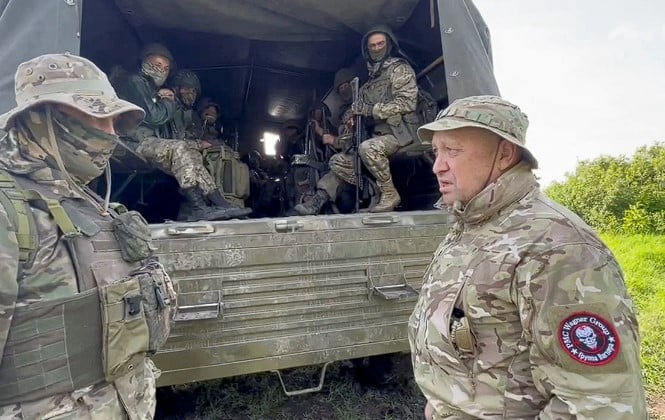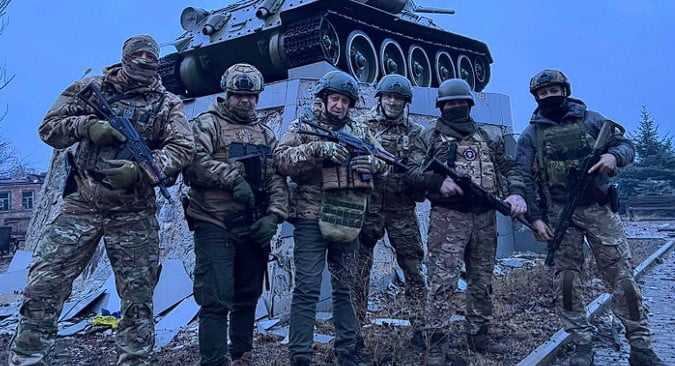Yevgeny Prigozhin, the leader of the Wagner mercenaries, experienced a devastating downfall due to his own arrogance and failure to gauge the dynamics within Putin’s inner circle, despite being a part of it.

According to a well-informed resident of Moscow, Prigozhin’s radical vision for change caught the system off guard, which ultimately led to his failed insurrection, and he retreated from the Russian military headquarters in Rostov-on-Don ,he was welcomed with expressions of gratitude from well-wishers. Like seasoned actors at the end of a gripping 24-hour performance, his battle-hardened troops waved goodbye to an apparently adoring crowd.
It’s uncertain whether it was all a theatrical display, but on Friday evening, Prigozhin believed it was his moment to shine as he called his heavily armed forces to action on the streets of Russia, not Ukraine. For weeks, even months, he had been criticizing the Russian elite’s war handlings in Ukraine, arguing that they showed callous disregard for the lives of Russian soldiers. This message struck many Russians who were aware of Putin and his inner circle’s propensity for lies, tolerating them only as long as their leader remained strong and stability prevailed.
Prigozhin’s charismatic and meticulously orchestrated rants from Bakhmut, where his fighters were making immense sacrifices while Putin gained marginal advantages in the grindingly slow war, resonated deeply. He appeared to be the embodiment of bravery, a Russian general unafraid to venture into the most dangerous territories. Prigozhin accused Russia’s Defense Minister Sergey Shoigu, a trusted member of Putin’s inner circle, of deliberately withholding ammunition from his troops. This friction between Prigozhin and Shoigu escalated into a bitter power struggle over control of Wagner and the highly lucrative ventures Prigozhin had developed for the Kremlin in Africa and other regions.
Putin, whose leadership relies on managing the interests of his inner circle to ensure their loyalty, should have swiftly intervened to quell the feud. Prigozhin’s relentless criticism of the military leadership and their mishandling of the war posed a dangerous threat to Putin’s regime. The renegade mercenary boss’s continuous diatribes about the flawed and dishonest military leadership sowed the seeds of dissent among the fertile minds of the populace.
Unfortunately for Prigozhin, he grossly underestimated the extent of support he had garnered, particularly among high-ranking military officials. In April, he managed to recruit Deputy Defense Minister Mikhail Mizintsev, a figure who had served directly in the Kremlin. Another influential defense official, Sergey Surovkin, who had briefly led Russia’s war efforts in Ukraine, became a favored ally of Prigozhin. “This is the only person with the star of the General of the Army who knows how to fight,” Prigozhin declared during his heated clash with the defense ministry in Moscow.
Rumors circulated about the mutual respect shared between Prigozhin and these military figures. Ramzan Kadyrov, an influential ally of Putin from Chechnya, heaped praise on Prigozhin’s troops, hailing them as courageous and indispensable. Kadyrov even attempted to mediate between Prigozhin and his authorities, promising better conditions as Prigozhin’s forces remained aligned with their cause.
On Friday night, Prigozhin claimed to have met with Shoigu, but the details of their discussion remain undisclosed. Shoigu abruptly left the meeting, and hours later, Prigozhin announced that he would not budge until Shoigu returned for further negotiations. In the meantime, he dispatched a fighting force to Moscow, making his intentions clear.
On late Saturday morning, as Prigozhin found himself holed up in the Russian military headquarters in Rostov-on-Don, Kadyrov played his hand as a kingmaker. He stated that this situation was not an ultimatum to the Ministry of Defense but a challenge to the state and so it was necessary to rally around the national leader.
Kadyrov branded Prigozhin as “treacherous” and deployed his special forces to remove the mercenary boss. The walls were closing in.
Prigozhin’s hopes of rallying Russian army generals to his cause quickly dwindled. Surovkin, the only general he held in high regard, released a video message urging him to “stop” and obey the will of President Vladimir Putin.
Faced with the potential of an Alamo-like standoff, Prigozhin seemed to negotiate his way out on Saturday afternoon, or at least he believed so. He claimed to have called off his rebel in Moscow only to protect “Russian blood,” but the truth was that his own life was on the edge.
Putin had publicly accused Prigozhin of “treason” and “armed rebellion.” However, Putin opted to use a diplomatic façade by allowing his neighbour, Belarus, and it’s President Alexander Lukashenko, to announce an amnesty and provide sanctuary for Prigozhin.
But by Monday, it became evident that the amnesty was no longer valid. Russian state media reported that charges against Prigozhin had not been dropped, and given Belarus’ dependence on Russia, it could offer little safety for him.
If Prigozhin still possesses any leverage, it lies in his questionable dealings involving diamonds, gold, and other ventures with Kremlin clients he helped recruit in Mali, the Central African Republic, Sudan, and Libya. Nevertheless, such currency tends to lose its value rather swiftly.
Prigozhin’s world has become significantly smaller and more perilous, but there can be little satisfaction for Putin in this, as his empire is currently at its most vulnerable state since he consolidated power from a different group of oligarchs two decades ago.
Article you wanna read :- Unraveling Power Struggles: The Dramatic Clash Between Russia’s Security Establishment and Yevgeny Prigozhin’s Militia in Ukraine”

